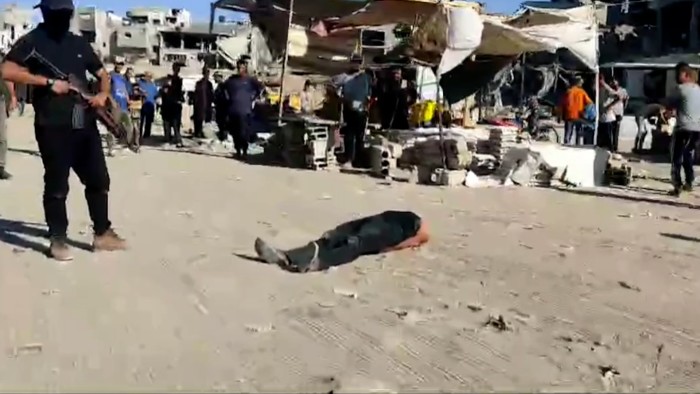The remnants of Gaza’s Hamas-run security forces have begun a violent crackdown on aid theft and spiralling black market prices in the enclave, including shooting suspects in the legs as they struggle to appease a starving population.
Armed men in plain clothes, who Palestinians say are policemen driven underground by Israeli targeting, have started to reconstitute in the enclave to act as a shadow force against wartime profiteering.
Traders dealing in looted aid have been threatened with hefty fines and with being shot in the knees, several Palestinians with knowledge of the matter told the Financial Times. More than a dozen suspected aid thieves were reportedly killed in a single operation on Monday as the clampdown intensified.
Nahed Shohaybr, head of Gaza’s private transport association, said he had seen multiple suspected profiteers shot in the legs from the window of his car as he was driving through the southern city of Khan Younis, where he lives. He estimated that about 100 suspected profiteers or thieves had been shot.
A video first shared on a Gaza Telegram channel in September, and verified by the FT, showed a hooded man with his hands tied behind his back writhing on the floor as a masked man shoots him repeatedly in the knees at a roundabout in Khan Younis.
Lawlessness and organised crime have flourished in Gaza since Israel’s devastating assault on the enclave following Hamas’s October 7 attack last year.
The Israeli military has systematically targeted police and criminal justice institutions, accusing them of being part of Hamas. In the ensuing security vacuum, thieves have taken control of the enclave’s aid entry routes and private traders resell the looted goods at a huge mark-up, forcing Gazans to pay for what was meant to be free.
Attempts by members of the prewar Hamas-led authorities, who have retained some measure of power within the strip, to keep the profiteering in check have ranged from the violent punishments to price caps introduced by the Ministry of National Economy in Gaza.
But they have done little to ease the crisis so far, according to Palestinian traders, economists and a former security officer.
The flow of aid into Gaza since October has been at its lowest level since the start of the war, meaning that markets have grown emptier and much of what is available is unaffordable for most families in the strip.
“The Ministry of Economy and supply investigators are attempting to impose control, but they lack the necessary numbers, capacity and protection given the rampant lawlessness and spread of weapons,” said Mohammad Barbakh, a researcher at the economy ministry.
An “emergency committee” formed during the war by Gaza’s de facto authorities has published price lists and warned traders to adhere to them in messages that circulate on Gazan news sites and social media groups.
Recent edicts have sought to impose a cap of 10 shekels ($2.68) for a kilogramme of tomatoes, and 6Shk for 1kg of sugar. But in practice, goods cost many times the set prices, with 1kg of tomatoes sold for about 47Shk and 1kg of sugar for 16Shk in mid-October, according to the latest available data from the Federation of Palestinian Chambers of Commerce, which monitors the market.
Attempts to regulate the sale of rotten and counterfeit goods have had only minimal success, Barbakh said. Earlier this month Gazans staged a rare protest against the wartime profiteers, holding signs saying “Down with the greed of the traders”.
A special operations police unit called “Sehem”, or “arrow”, formed earlier in Hamas’s rule of Gaza, has re-emerged during the war as a prominent counter-profiteering squad.
“As theft became widespread in Gaza amid the security vacuum, and because people were angry that Hamas was not doing anything to prevent these thefts, it appears that Hamas reactivated [Sehem],” said Amjad Okal, a former internal security officer with the Palestinian Authority’s Gaza force.
Some 20 members of aid-thieving gangs were killed in a joint operation by “security forces and tribal committees”, the Hamas-aligned Al-Aqsa telegram news channel reported on Monday, citing interior ministry sources.
“Today’s security operation will not be the last; it is the beginning of an expanded security operation that has been planned at length and will expand to include all those involved in looting aid trucks,” the sources told Al-Aqsa.
While many criminal groups in Gaza are linked to specific families, the people cited in the post said the operation aimed to target theft rather than particular clans.
Earlier this month, clan leaders in Gaza announced the formation of a joint “follow-up committee” to address the rise in prices, warning that traders who participated in profiteering would be “held responsible”.
Because of the heavy Israeli military presence near the southern border, what remains of Gaza’s police can only pursue those suspected profiteers who venture into the enclave’s central cities, said people familiar with the matter.
Shohaybr said he had also seen multiple undercover police officers killed by Israel’s military near his home, their bodies left out to bleed on the street. “Israel wants to create chaos and lawlessness,” he said.
Additional reporting by Sam Joiner
Video editing by Jamie Han and data visualisation by Aditi Bhandari
Read the full article here




